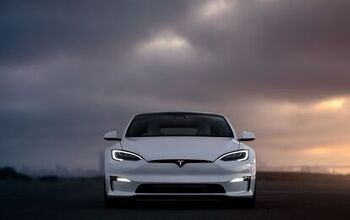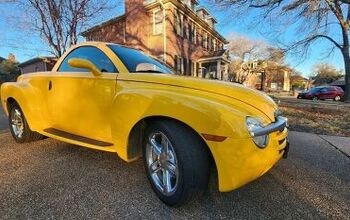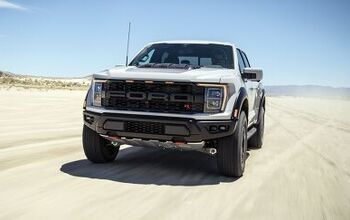Gas War: Tesla Asks U.S. to Increase Fuel Economy Fines

Last month, the U.S. National Highway Traffic Safety Administration (NHTSA) proposed new rules that would increase fines for automakers who previously failed to adhere to fuel efficiency requirements. EV manufacturer Tesla has predictably endorsed the rules and has begun urging the federal government to put the plan in action as soon as possible.
While automakers have issued concerns that increasing penalties could cost them over $1 billion per year through regulatory fines and the purchasing of carbon credits, Tesla has been asking the Biden administration and a U.S. appeals court to expedite the process and make the proposals binding. Though that’s undoubtedly because the company sells its credits to the tune of at least $350 million annually and doesn’t build a single automobile that’s powered by gasoline.
If you’re looking for a bad guy in this, there are plenty to choose from. Tesla is greedily trying to convince the government to hamstring its rivals while shoveling funds into its coffers; federal regulators now seem totally obsessed with destroying internal combustion engines and completely oblivious of the economic ramifications; this whole mess started because the previous administration delayed a 2016 rule that more than doubled penalties for automakers; and the current government doesn’t seem to be able to do anything but snap back to (or bolster) Obama-era policies.
Manufacturers have always had trouble adhering to Corporate Average Fuel Economy (CAFE) rules and I’ll be the first to question their efficacy. American consumers have long preferred larger vehicles with more robust powertrains, resulting in a slew of unpopular compliance vehicles and an average U.S. fuel economy (for all cars sold) that’s been hovering around 25 mpg for three presidential administrations. But this is all irrelevant to Tesla, who would happily let its rivals sweat as it avoids the matter by focusing on EVs.
According to Automotive News, Tesla executives met with the NHTSA on August 30th and issued a couple of letters:
The government memo said Tesla suggested NHTSA withdraw Trump’s action immediately, saying it “produces continuing uncertainty in investments and transactions across the industry, and any delays will continue to have deleterious effects on the credit market until the issue is resolved.” It added Tesla believes “any delays will continue to have deleterious effects on the credit market.”
Tesla on Aug. 27 separately again asked the Second Circuit U.S. Court of Appeals to quickly reinstate higher penalties. The court rejected Tesla’s request in April for immediate action pending NHTSA’s review.
“The uncertainty perpetuated by NHTSA’s sluggish rulemaking pace is thus compounded by the likelihood of yet another round of litigation,” Tesla wrote, warning uncertainty “may linger for several more years.”
Former President Donald Trump didn’t dissolve the rule, he simply pushed the original 2019 model year launch date for the larger penalties back to 2022 on the grounds that regulatory actions had run amok during the Obama administration. However, the Department of Transportation and NHTSA have been attempting to restore the original terms since Joe Biden took office. Though the potential for political intrigue is a lot lower than the above makes it seem. One side of the aisle wanted widespread industrial deregulation while the other wanted to increase regulatory measures.
Meanwhile, legacy automakers (including those transitioning toward electric vehicles) are broadly opposing updated CAFE rules that retroactively affect vehicles they sold before the 2022 model year. Manufacturers feel they adhered to the laws of the time and should not be subject to penalties incurred after a change in leadership and asked regulators to reconsider in August.
[Image: Virrage Images/Shutterstock]

A staunch consumer advocate tracking industry trends and regulation. Before joining TTAC, Matt spent a decade working for marketing and research firms based in NYC. Clients included several of the world’s largest automakers, global tire brands, and aftermarket part suppliers. Dissatisfied with the corporate world and resentful of having to wear suits everyday, he pivoted to writing about cars. Since then, that man has become an ardent supporter of the right-to-repair movement, been interviewed on the auto industry by national radio broadcasts, driven more rental cars than anyone ever should, participated in amateur rallying events, and received the requisite minimum training as sanctioned by the SCCA. Handy with a wrench, Matt grew up surrounded by Detroit auto workers and managed to get a pizza delivery job before he was legally eligible. He later found himself driving box trucks through Manhattan, guaranteeing future sympathy for actual truckers. He continues to conduct research pertaining to the automotive sector as an independent contractor and has since moved back to his native Michigan, closer to where the cars are born. A contrarian, Matt claims to prefer understeer — stating that front and all-wheel drive vehicles cater best to his driving style.
More by Matt Posky
Latest Car Reviews
Read moreLatest Product Reviews
Read moreRecent Comments
- SCE to AUX Norway is in Europe, and Tesla is an American automaker - no problems there.I wouldn't use Ford as the bellwether.https://www.reuters.com/business/autos-transportation/tesla-extends-lead-norway-evs-take-record-82-market-share-2024-01-02/https://elbil.no/english/norwegian-ev-policy/
- Steve Biro If the U.S. government wants to talk about banning all connected cars - or at least the collection and sharing of information from said vehicles - I’m all ears. Otherwise, don’t waste my time.
- Ajla Both parties are in favor of banning Chinese vehicles so I don't see how it won't happen in the next year.
- Add Lightness I don't waste a lot of time watching nothing much happening by watching the YouTube 6 minute highlights.
- MrIcky from my rental fleet experience, id rather drive one of these than a camry.


































Comments
Join the conversation
I will not buy a Tesla product either. As much as I don't like GM and Ford I would trust either of them more than Elon Musk. The ones to watch will be Toyota with their solid state battery and VW.
If all the ICE vehicles went away tomorrow, I would still not buy a Tesla. While the Model S is a nice looking vehicle no the outside and the quality might be fine, I would not want to pay for a model S and could not live with the interior of the lesser models at any price.